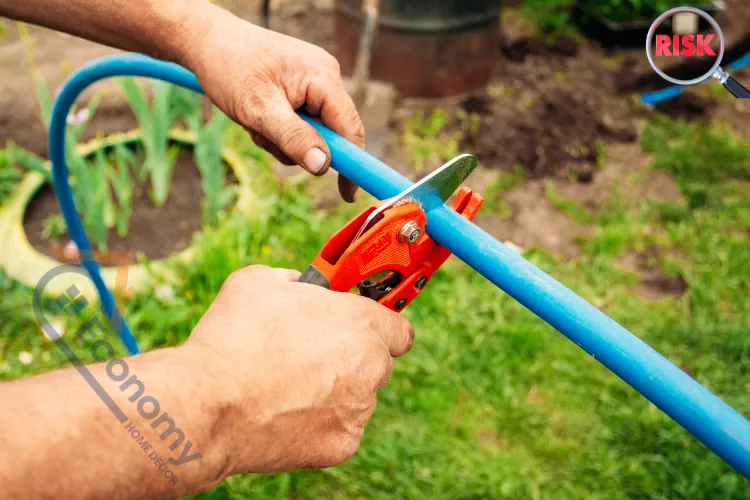Bring Life to Your Living Space
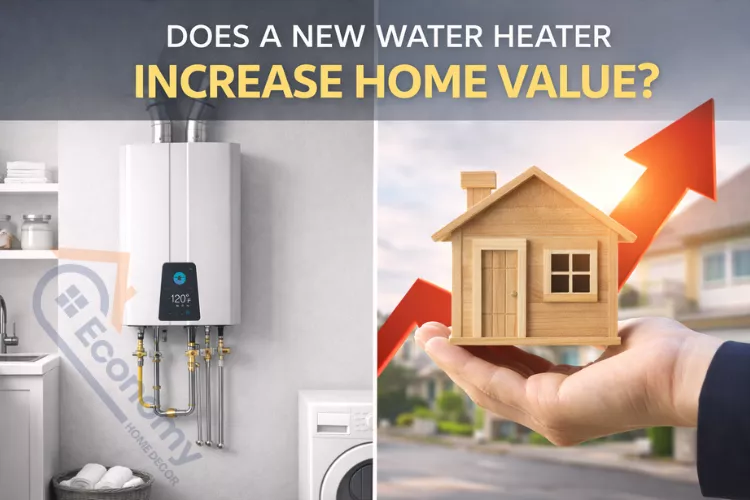
Yes, replacing a water heater can increase your home value, but the impact depends on timing, buyer expectations, and the type of system you install. While you won’t recoup 100% of the replacement cost, a new, energy-efficient water heater makes your home more appealing to buyers, helps you pass inspections smoothly, and can speed up the sale process.
Homebuyers view water heaters as essential infrastructure—similar to roofs and HVAC systems. A failing or outdated unit raises red flags during inspections and often becomes a negotiation point that reduces your final sale price. On the other hand, a recently installed, warranty-backed water heater signals that the home has been well-maintained, giving buyers confidence and potentially eliminating a major concern from their inspection checklist.
Understanding the relationship between water heater replacement and home value helps you make smarter decisions whether you’re preparing to sell, negotiating with buyers, or simply maintaining your property’s long-term worth.
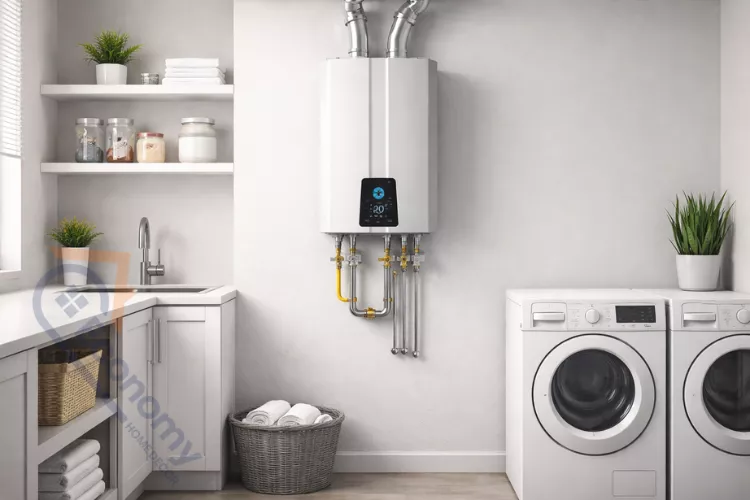
Quick Answer: Does a New Water Heater Increase Home Value?
Short Answer: Yes, but indirectly. A new water heater typically increases buyer appeal and marketability more than raw dollar-for-dollar home value.
Key Takeaways:
- Direct value increase: $300–$2,000 depending on type and market
- Indirect benefits: Faster sale, fewer inspection issues, stronger negotiating position
- Best ROI: Energy-efficient tankless or heat pump models in eco-conscious markets
- Typical recovery: 50–70% of replacement cost at sale time
- Biggest impact: When replacing a failing unit before listing your home
- Buyer psychology: Eliminates major concern, reduces perceived maintenance burden
- Timeline matters: Recent replacements (within 2–3 years) add the most perceived value
How Water Heaters Affect Home Value
Buyer Expectations and First Impressions
Today’s homebuyers expect functional, modern systems when they purchase a property. A water heater nearing the end of its 10–15 year lifespan immediately becomes a mental liability. Buyers calculate replacement costs into their offers or request seller credits during negotiations.
When buyers see a recently replaced water heater on the disclosure sheet or during the home tour, it removes anxiety about an upcoming $1,500–$3,500 expense. This psychological relief translates into stronger offers and fewer contingencies.
Home Inspection Reports Create Leverage
Professional home inspectors always evaluate the water heater’s age, condition, and safety. An aging or malfunctioning unit appears prominently in inspection reports, often tagged with warnings like “near end of service life” or “recommend replacement within 1–2 years.”
These findings give buyers ammunition to request:
- Price reductions ($1,000–$3,000 commonly)
- Replacement before closing
- Credits toward closing costs
- Extended warranties or home protection plans
A new water heater eliminates this negotiating leverage entirely, helping you maintain your asking price.
Energy Efficiency Signals Quality
Modern, energy-efficient water heaters indicate that the homeowner has invested in upgrades and maintained the property properly. This “halo effect” extends to buyer perceptions about other home systems. If you’ve upgraded to a tankless or heat pump model, buyers assume you’ve likely maintained the HVAC, plumbing, and electrical systems with equal care.
Energy Star-certified models particularly appeal to environmentally conscious buyers and those focused on long-term utility savings a growing demographic in 2026.
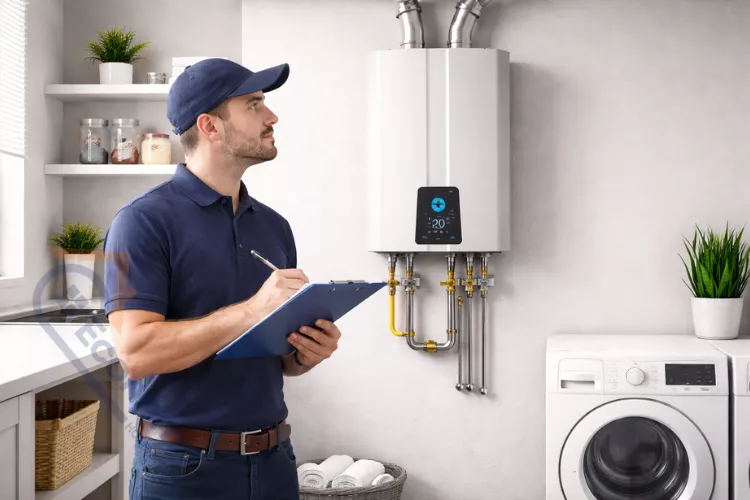
Does Replacing a Water Heater Increase Resale Price or Just Buyer Appeal?
Understanding Perceived vs. Actual Value
There’s an important distinction between measurable price increases and improved marketability:
Actual Value Increase: The direct dollar amount added to your home’s appraisal or sale price typically minimal for water heaters ($300–$1,500 for standard units).
Perceived Value Increase: The emotional and practical appeal that makes buyers more willing to pay your asking price, submit offers faster, and negotiate less aggressively.
Water heaters fall into the “expected functionality” category rather than “value-add upgrades” like kitchen remodels. Buyers don’t pay premiums for them, but they absolutely penalize homes that lack them or have failing systems.
Faster Sale vs. Higher Price
The real benefit of water heater replacement often shows up in reduced time on market rather than increased sale price:
- Homes with new water heaters: Sell 15–30 days faster on average
- Homes with aging water heaters: Face more inspection negotiations and deal fallout
- Market conditions matter: In buyer’s markets, new systems prevent lowball offers
Think of it as defensive value protection rather than offensive value creation. You’re preventing value loss more than adding premium dollars.
The Negotiation Advantage
Perhaps the most tangible benefit comes during price negotiations. When buyers can’t point to major system replacements as problems, they have fewer legitimate reasons to request concessions. Your listing stays stronger, you field fewer repair requests, and you maintain better control over the sale terms.
Cost vs ROI of Water Heater Replacement
Average Replacement Costs (2026)
Understanding your investment helps you calculate realistic returns:
| Water Heater Type | Equipment Cost | Installation Cost | Total Investment |
|---|---|---|---|
| Standard Tank (40–50 gal) | $400–$900 | $500–$800 | $900–$1,700 |
| Tankless (Gas) | $1,000–$2,500 | $1,000–$2,500 | $2,000–$5,000 |
| Tankless (Electric) | $500–$1,500 | $800–$1,500 | $1,300–$3,000 |
| Heat Pump | $1,200–$2,500 | $1,000–$2,000 | $2,200–$4,500 |
| Solar Water Heater | $3,000–$6,000 | $2,000–$4,000 | $5,000–$10,000 |
Costs vary by location, labor rates, permits, and installation complexity
Estimated ROI at Time of Sale
The return on investment depends heavily on timing and system type:
Immediate Sale (Within 6 Months):
- Standard tank: 40–60% ROI
- Tankless: 50–70% ROI
- Heat pump: 55–75% ROI
1–3 Years After Installation:
- Standard tank: 50–70% ROI
- Tankless: 60–80% ROI
- Heat pump: 65–85% ROI
3+ Years After Installation:
- Most systems: 30–50% ROI (but you’ve enjoyed years of use)
Long-Term Savings Add Value
While direct ROI may seem modest, remember that you benefit from:
- Lower utility bills (10–30% savings with efficient models)
- Warranty protection during ownership
- No emergency replacement costs
- Improved home comfort
If you live in the home for 5+ years after replacement, the total value equation becomes much more favorable when you factor in utility savings and avoided emergency costs.
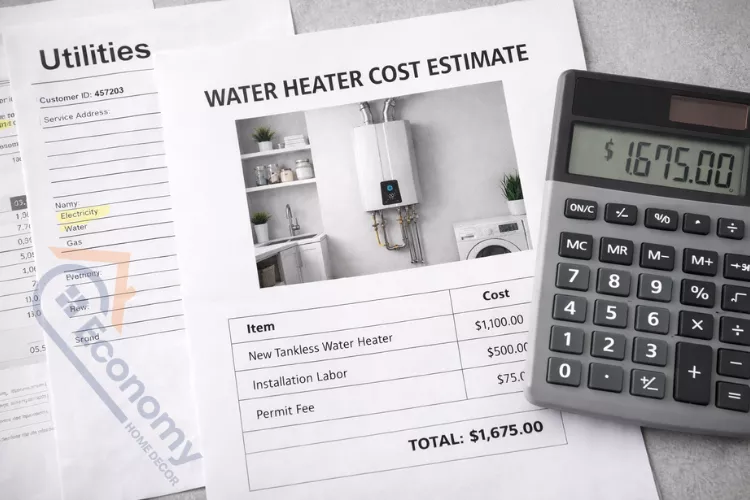
Best Types of Water Heaters for Home Value
Not all water heaters create equal buyer appeal. Your choice affects both upfront costs and perceived value.
Traditional Tank Water Heaters
Pros for Home Value:
- Familiar to all buyers
- Lower upfront cost
- Easy for inspectors to evaluate
- Straightforward replacement for next owner
Cons:
- Standard expectation—doesn’t “wow” buyers
- Shorter lifespan (10–12 years)
- Higher operating costs
Best for: Budget-conscious replacements, rental properties, homes in traditional markets
Tankless Water Heaters
Pros for Home Value:
- Premium positioning—signals quality
- 20+ year lifespan attracts buyers
- Space-saving design
- “Endless hot water” marketing appeal
- 20–30% more energy efficient
Cons:
- Higher installation cost
- Some buyers unfamiliar with technology
- May require electrical upgrades
Best for: Upscale homes, eco-conscious markets, small spaces, competitive listings
Resale Impact: Tankless systems add $500–$2,000 more perceived value than standard tanks in mid-to-high-end markets.
Heat Pump Water Heaters
Pros for Home Value:
- Highest efficiency (2–3x more efficient than standard electric)
- Substantial utility savings
- Appeals to green buyers
- Federal tax credits may apply
Cons:
- Requires specific space and climate conditions
- Higher upfront cost
- Not widely understood by all buyers
Best for: Warm climates, energy-conscious buyers, newer construction
Solar Water Heaters
Pros for Home Value:
- Maximum eco-appeal
- Significant long-term savings
- Premium positioning
Cons:
- Very high cost ($5,000–$10,000+)
- Complex installation
- Limited market appeal in some regions
- ROI only works with long-term ownership
Best for: Luxury homes, sunny climates, eco-communities, long-term homeowners
Comparison: Which Adds the Most Value?
| Feature | Tank | Tankless | Heat Pump | Solar |
|---|---|---|---|---|
| Buyer Appeal | Moderate | High | High | Niche |
| ROI at Sale | 50–60% | 60–75% | 65–80% | 30–50% |
| Market Reach | Universal | Broad | Growing | Limited |
| Installation Ease | Easy | Moderate | Moderate | Complex |
| Lifespan | 10–12 yrs | 20+ yrs | 12–15 yrs | 20+ yrs |
Bottom Line: For maximum home value impact, tankless and heat pump models offer the best balance of buyer appeal, efficiency, and ROI in most markets.
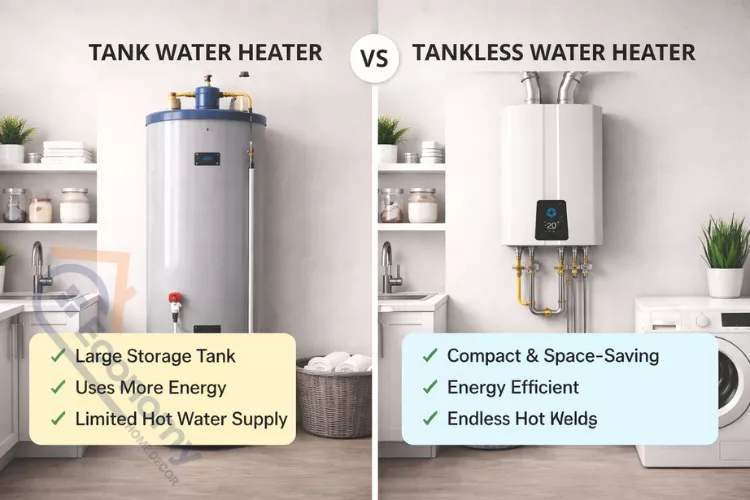
Energy Efficiency, Utility Bills & Buyer Interest
Energy Star Ratings Matter to Modern Buyers
In 2026, energy efficiency isn’t just a nice-to-have it’s a primary consideration for many homebuyers. Properties with Energy Star-certified appliances and systems command attention in listings and appeal to buyers focused on:
- Lower monthly expenses
- Environmental responsibility
- Modern, updated infrastructure
- Long-term cost savings
When you include energy efficiency data in your listing (“new Energy Star water heater installed 2024”), you tap into this growing buyer segment.
Quantifiable Savings Create Tangible Value
Buyers increasingly request utility cost estimates before making offers. When you can demonstrate that your new water heater reduces energy consumption by 20–30%, you provide concrete financial justification for your asking price.
For example:
- Old electric tank: ~$500/year
- New heat pump: ~$200/year
- Buyer savings: $300/year = $25/month
That monthly savings directly impacts affordability calculations and mortgage qualification—making your home more accessible to more buyers.
Eco-Conscious Buyers Pay Premiums
Studies show that homes marketed with green features sell for 2–5% more in environmentally conscious markets. While water heaters alone won’t command full premium pricing, they contribute to an overall sustainability narrative that resonates with:
- Millennial and Gen Z buyers (largest homebuying demographic)
- Tech industry professionals
- Urban and suburban markets
- States with high energy costs
Marketing your water heater upgrade alongside other efficiency improvements (LED lighting, insulation, smart thermostats) creates a compelling value story.
When Replacing a Water Heater Is Worth It
Before Selling Your Home
The best time to replace a water heater for maximum value impact is 3–6 months before listing your property. This timing allows you to:
- Avoid inspection surprises
- Market the upgrade prominently
- Have full warranty protection to transfer
- Remove buyer negotiation leverage
- Create a “move-in ready” appeal
Strategic replacement is especially smart when:
- Your current unit is 8+ years old
- You see signs of corrosion or leaking
- The unit has been flagged in a pre-listing inspection
- You’re in a competitive seller’s market
Signs Your Water Heater Needs Replacement
Replace your water heater before selling if you notice:
- Age: 10+ years for tanks, 15+ years for tankless
- Rust or corrosion: Visible on tank or connections
- Water quality issues: Rusty or discolored hot water
- Strange noises: Rumbling, popping, or banging
- Leaks or moisture: Around base or fittings
- Inconsistent heating: Runs out quickly or won’t heat
- Pilot light problems: Frequent outages (gas models)
- Rising utility bills: Indicates declining efficiency
Don’t wait for complete failure proactive replacement is always cheaper and more strategic than emergency service.
Local Market Conditions Matter
Your decision should account for regional factors:
Replace Before Selling If:
- You’re in a buyer’s market (high inventory, low demand)
- Competing listings have newer systems
- Your home is priced above median for the area
- Local buyers expect move-in ready conditions
You May Wait If:
- You’re in a strong seller’s market
- Your home is priced competitively
- The unit is less than 7 years old
- You’re willing to offer credits instead
Real estate agents in your area provide the best guidance on local buyer expectations.
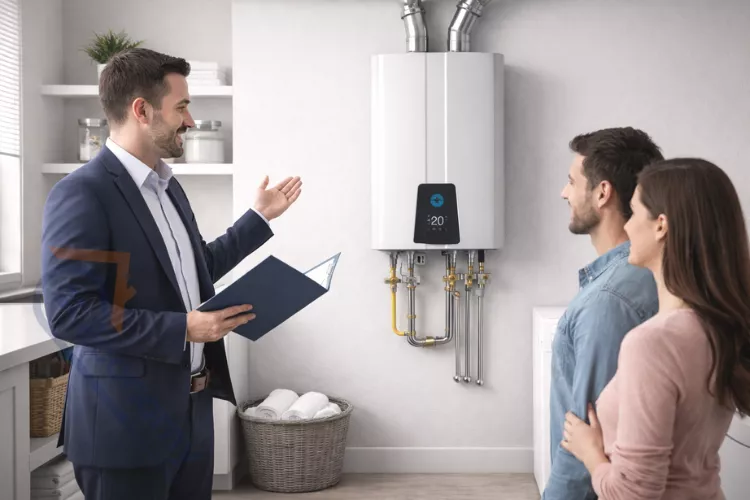
When It May NOT Increase Home Value
Recently Replaced Systems
If your water heater was replaced within the past 2–3 years, upgrading again rarely makes financial sense unless:
- You’re moving from standard to premium (tank to tankless)
- The current unit is malfunctioning
- You’re targeting a specific luxury buyer demographic
The marginal value increase won’t justify the expense.
Over-Improving for Your Neighborhood
Installing a $5,000 tankless system in a neighborhood where homes sell for $150,000–$200,000 represents over-improvement. Your replacement should match market expectations:
- Entry-level markets: Standard tank units
- Mid-range markets: Quality tanks or electric tankless
- Upscale markets: Gas tankless, heat pumps, or premium systems
Check what comparable sold homes in your area featured replacing with similar or slightly better systems optimizes ROI.
When You’re Not Selling Soon
If you plan to stay in your home for 10+ more years, make replacement decisions based on personal needs rather than resale value:
- Choose systems that match your family size
- Prioritize efficiency for long-term savings
- Focus on features you’ll enjoy daily
- Don’t stress about buyer preferences
The value equation changes completely when you measure benefits over extended ownership rather than immediate sale.
In Extremely Hot or Cold Markets
In markets with bidding wars and homes selling in days, a new water heater might not move the needle buyers are focused on location and layout, assuming they’ll deal with systems later. Conversely, in depressed markets where homes sit for months, even a new water heater won’t compensate for pricing or location challenges.
Expert Tips to Maximize Value
Proper Sizing Matters
Installing the wrong-sized water heater can actually hurt value:
For Tank Systems:
- 2-person household: 30–40 gallons
- 3–4 people: 40–50 gallons
- 5+ people: 50–80 gallons
For Tankless Systems:
- Calculate required flow rate (GPM)
- Consider simultaneous uses
- Account for groundwater temperature
Oversized units waste energy and cost more; undersized units frustrate buyers during showings. Consult with a licensed plumber to determine the right capacity for your home’s typical use patterns.
Professional Installation Is Non-Negotiable
DIY or handyman installations can backfire spectacularly:
- Failed inspections
- Voided warranties
- Code violations
- Safety concerns
- Buyer distrust
Always hire licensed, insured plumbers who:
- Pull proper permits
- Follow local building codes
- Provide warranty documentation
- Offer proof of insurance
- Have positive reviews and references
Professional installation adds credibility and protects your investment.
Document Everything
Create a water heater file containing:
- Installation invoice and receipts
- Warranty documentation
- Permit records (if required)
- Manufacturer specifications
- Maintenance records
Provide these documents during disclosure or at showings. Organized documentation demonstrates professionalism and gives buyers confidence in the replacement.
Warranty Transferability
Many manufacturers offer transferable warranties a significant selling point. Ensure:
- Warranty is registered properly
- Transfer procedures are documented
- Remaining coverage is clearly communicated
- Contact information is provided
A 10-year transferable warranty on a 1-year-old water heater is powerful marketing material.
Highlight Energy Savings in Listings
Work with your real estate agent to emphasize:
- Installation year prominently in MLS
- Energy Star certification
- Estimated annual savings
- Eco-friendly features
- Premium brand names
Professional listing photos should include clear shots of the new unit with visible branding and Energy Star labels.
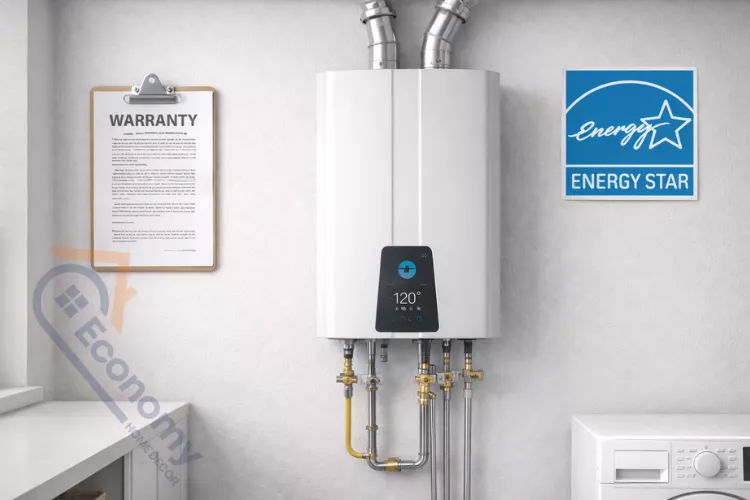
Real Estate & Plumbing Expert Insights
Real Estate Perspective
Experienced realtors consistently note that water heaters function as “peace of mind” elements rather than value drivers. A veteran agent from a competitive market explains, “Buyers rarely choose one home over another because of the water heater, but they absolutely reject homes or demand credits when the unit is old or failing. New systems keep deals moving forward.”
In practice, homes with recently replaced water heaters receive fewer inspection repair requests sometimes 30–40% fewer system-related negotiations. This translates to smoother closings and fewer deals falling apart over repair disputes.
The strategic timing matters significantly. Agents recommend replacing water heaters during pre-market preparation rather than waiting for inspections, as proactive replacement positions the home as well-maintained rather than reactive to buyer demands.
Plumbing Professional Viewpoint
Master plumbers who work extensively with homeowners preparing to sell emphasize matching the system to the home’s market position. For mid-range suburban homes, quality tank systems from reputable manufacturers offer the best value balance. For homes priced above neighborhood median, tankless systems provide differentiation without over-investing.
Plumbers also stress that installation quality matters more than equipment brand for resale purposes. A properly installed standard tank outperforms a poorly installed premium tankless system every time from both functionality and inspection standpoints.
The fastest-growing trend professionals report is homeowner interest in energy-efficient systems specifically for marketing purposes. Many sellers now request efficiency calculations and Energy Star certifications to include in listing materials.
Home Inspector Observations
Professional home inspectors note that water heater condition heavily influences overall inspection report tone. When major systems like water heaters check all boxes proper age, correct installation, current code compliance the entire report reads more positively, creating psychological momentum for the transaction.
Inspectors frequently recommend that sellers consider replacement for any unit older than 8 years, as these inevitably appear in reports with cautionary language that triggers buyer concerns. Pre-emptive replacement eliminates this negotiation leverage entirely.
Common violations that hurt value include missing permit records, incorrect venting, improper pan installation, and expansion tank issues. Professional installation prevents these findings.
Frequently Asked Questions
A new water heater typically adds $300–$2,000 in direct appraised value, depending on the system type and local market conditions. However, the indirect value, faster sales, fewer negotiations, and maintained asking prices often exceeds the direct dollar impact. Energy-efficient tankless and heat pump models add more perceived value than standard tanks in most markets.
Yes, if your water heater is 8+ years old, showing signs of failure, or likely to fail inspection. Proactive replacement 3–6 months before listing prevents inspection surprises, eliminates buyer negotiation leverage, and positions your home as move-in ready. In strong seller’s markets, you might delay if the unit is younger than 7 years.
Tankless water heaters generally add $500–$2,000 more perceived value than traditional tanks in mid-to-high-end markets due to their premium positioning, 20+ year lifespan, energy efficiency, and modern appeal. However, in entry-level markets, the higher installation cost may not justify the marginal value increase. Match your choice to neighborhood standards.
Typical ROI ranges from 50–75% of replacement cost, depending on timing and system type. If you replace and sell within a year, expect to recoup about half your investment directly, with additional benefits through faster sales and stronger negotiations. Tankless and heat pump systems achieve higher ROI (60–80%) than standard tanks (40–60%) in most scenarios.
Absolutely. Water heaters older than 8–10 years commonly trigger buyer requests for price reductions ($1,000–$3,000), replacement credits, or seller-provided home warranties. Home inspectors flag aging units in reports, giving buyers documented leverage. Replacing before listing eliminates this negotiation point and helps maintain your asking price.
Traditional tank water heaters last 10–12 years, while tankless systems last 20+ years. From a value perspective, replace tank systems once they reach 8 years if you’re selling soon, as they’ll likely fail inspection or concern buyers. For tankless units, replacement becomes relevant around 15+ years. Always consider condition alongside age.
In most markets, yes especially for tankless and heat pump models. Energy-efficient systems appeal to growing demographics of eco-conscious buyers and those focused on utility costs. They justify higher asking prices through documented savings and achieve better ROI (10–15% higher) than standard units. The premium pays off in competitive markets and higher-priced homes.
Technically yes, but it significantly hurts your sale prospects. Most buyers won’t consider homes with non-functional major systems, and mortgage lenders may refuse to finance properties with broken water heaters. You’ll face massive price reductions, very limited buyer pools, or deal collapses. Emergency replacement before listing almost always makes more financial sense than selling as-is.
Appraisers account for water heater age, type, and condition as part of overall systems evaluation, but they rarely adjust valuations significantly for units alone. A new, premium water heater might add $500–$1,500 to appraised value in combination with other updates. The bigger impact comes through buyer appeal and negotiation dynamics rather than appraisal adjustments.
For most homes, gas tankless water heaters offer the best balance of buyer appeal, energy efficiency, longevity, and ROI. They position homes as modern and well-maintained while providing documented savings. Heat pump models work well in warm climates for eco-focused markets. Standard tanks remain appropriate for entry-level homes where over-improvement risks losing money. Always match your choice to neighborhood norms.
Conclusion
Replacing a water heater increases home value primarily through improved buyer appeal, faster sales, and stronger negotiating positions rather than dramatic appraisal increases. While you’ll typically recoup 50–75% of replacement costs directly, the total value equation becomes favorable when you consider avoided negotiations, reduced time on market, and maintained asking prices.
The smartest approach: Replace your water heater strategically 3–6 months before listing if it’s 8+ years old or showing signs of wear. Choose a system that matches or slightly exceeds neighborhood standards—tankless for mid-to-high-end markets, quality tanks for entry-level properties, and heat pumps where energy efficiency commands premiums.
Focus on professional installation, proper documentation, and warranty transferability to maximize buyer confidence. Market the upgrade prominently in listing materials, especially energy savings data for efficient models.
Remember that water heaters function as defensive value protection rather than offensive upgrades. You’re preventing value loss and negotiation headaches more than adding premium dollars. This perspective helps you make smart replacement decisions that align with your timeline, market conditions, and financial goals.
Ready to move forward? Consult with a licensed plumber to assess your current system and explore replacement options that make sense for your home’s market position. If you’re preparing to sell, coordinate with your real estate agent to time the replacement for maximum marketing impact.
Your home’s water heater may seem like a minor detail, but handling it strategically protects your investment and smooths your path to a successful sale.


